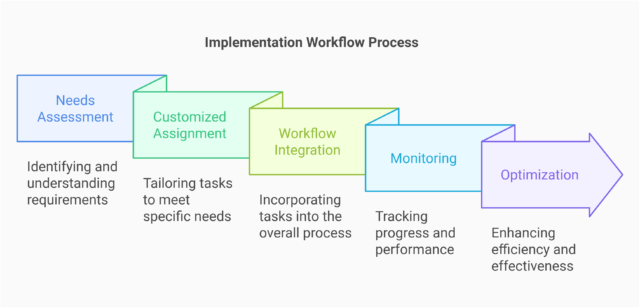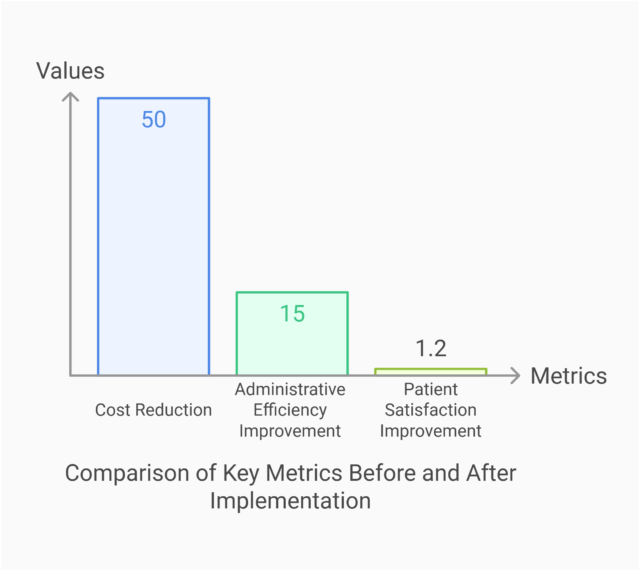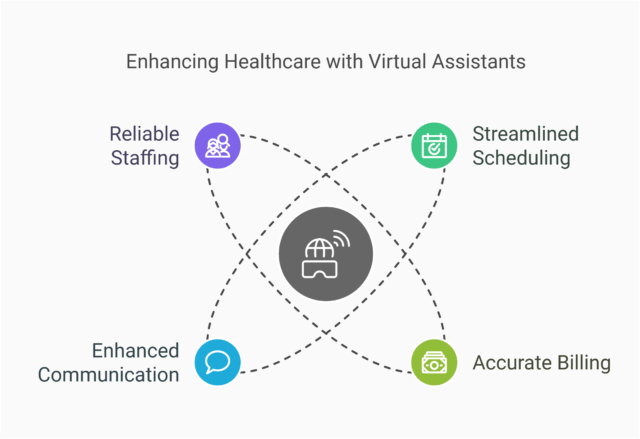Abstract
Running an allergy and immunology practice can be a lot of work, which can get in the way of patient care. This study looks at how a mid-sized clinic used Rekha Tech LLC’s Virtual Assistant for Allergy and Immunology services. This customized virtual assistant for allergy and immunology solved important problems including not having enough staff, too much administrative work, and high costs. As a result, efficiency, patient happiness, and operational stability all improved. Graphs and flowcharts show how the process works, what problems it has, and what happens.
Virtual Assistant Integration Process
Allergy and immunology practices have a lot of operational problems, including as:
Difficulties in hiring: It takes a long time to find suitable administrative workers who know how to do allergy and immunology-related tasks.
High Turnover Rates: Changing staff often makes work harder and costs more.
Too Much Work for the Office: Scheduling, billing, and keeping records are too much for in-house staff.
Cost Pressures: The costs of paying full-time employees’ salary, perks, and training are putting a pressure on resources.
Concerns about patient satisfaction: Problems with communication and operations hurt patient trust.
Rekha Tech LLC’s Allergy and Immunology Practice Virtual Assistant Services offered a flexible way to deal with these problems. These problems can be solved quickly by practices that want to recruit a virtual allergy and immunology helper.
The process of integrating a virtual assistant
There were five steps to the implementation process:
Needs Assessment: Finding the specific problems and gaps in the way medical allergy and immunology practices run that require healthcare virtual assistants.
Customized Assignment: Using a virtual assistant to handle allergy and immunology tasks like billing, scheduling, and talking to patients.
Workflow Integration: Making sure that the tasks of an allergy and immunology healthcare virtual assistant work with the systems that are already in place, like billing platforms and scheduling software.
Monitoring performance means keeping an eye on things like how well the schedule is working, how accurate the billing is, and how happy the patients are.
Continuous Optimization: Improving workflows based on performance data and changing needs of the practice.


Key Metrics of Improvement
Important Metrics of Progress:
Cost-Effectiveness
- Costs Before Implementation: $45,000 per month for salaries, benefits, and training.
- Costs after implementation: $20,000 a month for allergy and immunology virtual assistant costs.
- Result: 50% less money spent on running the business.
Efficiency in Administration
- Before the project started, staff spent 65% of their time on administrative chores.
- After the implementation, staff spent 80% of their time caring for patients with help from the Allergy and Immunology Scheduling Virtual Assistant, the Allergy and Immunology Billing Virtual Assistant, and the Allergy and Immunology Appointment Scheduling Virtual Assistant.
Satisfaction of Patients
- Before Implementation: 3.5 out of 5 stars.
- After the implementation, the average rating was 4.7 out of 5.
- Result: 18% more satisfied patients, thanks to the Allergy and Immunology Virtual Assistant for Patient Communication and the Allergy and Immunology Virtual Assistant for Appointment Reminders.
Key Benefits of Virtual Assistance
Discussion
The main benefits of virtual help
- Streamlined Scheduling: The Allergy and Immunology Appointment Scheduling Virtual Assistant cut down on no-shows by 30% by sending out automated reminders.
- The Virtual Allergy and Immunology Assistant for Billing and Insurance helps with accurate billing by reducing claim denials and speeding up reimbursements, which improves cash flow.
- Better Communication: The Allergy and Immunology Virtual Assistant for Patient Communication gave quick, consistent answers, which made patients trust them more.
- Reliable Staffing: By using Outsource Allergy and Immunology Assistants, we made sure that support was always available, which kept things running smoothly.
What Medical Virtual Assistants Do
This study shows how important allergy and immunology healthcare virtual assistants are for keeping practice operations up to date. By hiring an allergy and immunology virtual assistant in healthcare, clinics can focus on patient care while also increasing their financial and operational performance.

Conclusion
Key Outcomes
- Cost Reduction: Allergy and immunology virtual assistants can cut operational costs by 50%.
- More efficient: 80% of staff time is now spent on direct patient treatment, thanks to Allergy and Immunology Virtual Assistants for office management, scheduling, and invoicing.
- Better Patient Satisfaction: 18% more satisfied patients.
What this means for strategy
If a clinic wants to get past staffing and operational problems, it should invest in Allergy & Immunology Practice Virtual Assistant Services. Rekha Tech LLC’s solutions make it possible for practices to recruit virtual assistants to help with allergy and immunology office management. This lays the groundwork for long-term growth and better patient care.
Future Directions
More research could look into:
The long-term effects of adding an allergy and immunology virtual assistant on revenue growth.
Adding virtual services to multi-specialty offices that aren’t just for allergy and immunology.
Improvements in AI-powered virtual assistant services for allergy and immunology healthcare to make them more scalable and useful.
Ready to Transform Your Practice?
Get started with Rekha Tech LLC and let us simplify your dental practice operations today!


